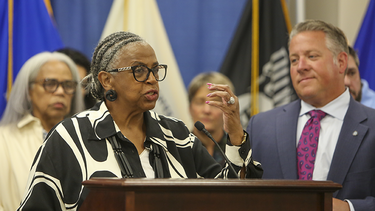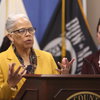‘No silver bullet’: Programs to combat homelessness, addiction, and mental-health crises
ALBANY COUNTY — County, city, court, and state leaders are working with charitable groups in a united effort to stem homelessness and to deal with burgeoning mental-health and addiction crises.
They stood together at a press conference on Sept. 20, hosted by Albany County Executive Daniel McCoy who said, “It’s about taking a chance because what we’re doing isn’t working.”
He also noted a statistic from the National Alliance on Mental Illness that says one in 20 adults in the United States experience serious mental illness each year.
“We were in the middle of a mental-health crisis, an overdose crisis,” said McCoy. “Then we hit COVID and then we isolated and then we shut down — and people were alone and morphed even more.”
McCoy said Albany has over 700 women living in shelters with their children and 129 kids under the age of 18 living in shelters.
The officials described a half-dozen initiatives in various stages of execution.
Mercy House is to be reopened in collaboration with Interfaith Partnership for the Homeless. IPH offers a continuum of services for individuals and families who are homeless or at risk of homelessness and currently has a drop-in center on Sheridan Avenue in Albany.
A program that piloted in the Hilltowns in 2021 to send social workers and medics rather than police officers on mental-health calls is to be expanded to Albany by 2025.
And very soon, more trained individuals will work with unsheltered people on the streets to guide them to available programs, as the city partners with Community Access to Resources and Services, known as CARES, to expand its program.
Mental Health Court is also to be expanded as is a program that diverts offenders arrested for nonviolent crimes who suffer from addiction, mental illness, and poverty from the criminal justice system into community-based programs that can help them.
Mayor’s view
Albany’s mayor, Kathy Sheehan, described the two-fold nature of the problems.
On the one hand, she outlined “a serious mental health crisis in our community” intertwined with “a crisis of substance abuse” and “a crisis of homelessness.” She said, “We have individuals in our community living on our streets who need our help.”
On the other hand, she said, “We also have residents and businesses and people coming into our city who are frustrated. They’re even angry because they see this, and it is impacting their businesses. It is impacting how people feel in our city.” Citing an example, she said parents have taken their kids to parks and found needles.
Noting the problem is nationwide, affecting both red states and blue states, and Democratic mayors, like herself, and Republican mayors, Sheehan said, “We don’t wait for Washington.” She credited, to applause, the work of Stephen Giordano, Ph.D., who heads the county’s department of mental health.
While Sheehan acknowledged more beds in clinical settings are needed and more housing options are needed, she also said,”We can’t wait. We need to make sure that there are case managers and clinicians who are able to go where people are.”
Sheehan said it made “no sense” for the city of Albany to set up its own clinical program; rather, it is working with the county and with the community-based organizations that already contract with the county.
“We just want a seat at the table ….,” she said. “We can reset the norms for our city and make sure that we are sending a message to our residents and our businesses that, no, it’s not OK for you to have people defecating in front of your business. It’s not OK for you to find needles in the park when you take your children there to play.”
The right resources, Sheehan said, need to be brought to get to the root of the problem. A police officer isn’t the answer, she said.
Rather, the city is allocating $300,000 of its opioid recovery money every year for the next three years to a “street treatment program,” Sheehan said, which she hopes will expand in partnership with Albany County.
ACCORD
Two years ago, the Albany County Crisis Officials Responding and Diverting program, known as ACCORD, was launched in the Hilltowns.
In the reckoning that followed George Floyd’s murder in Minneapolis in May 2020, as communities across the country re-evaluated the role of police, New York’s governor at the time, Andrew Cuomo, required each police department to come up with a reform plan.
“The question we were always talking about was: What else can we be doing to make sure those suffering from mental-health crises are met with the appropriate personnel?” said Matthew Peter, the Albany legislator who broached the idea that led to ACCORD.
Albany County looked to a program launched across the country in Eugene, Oregon in 1989 called CAHOOTS, for Crisis Assistance Helping Out On The Streets. The community-based public safety system provides mental-health first response for crises involving mental illness, homelessness, and addiction.
Giordano stressed when the program was launched that it was an enhancement. “We have a 24/7 mobile crisis team for the county,” he said in 2021.
“We have been in the business of mobile crisis for 35 years,” he said. “We were the first in New York State and we are already responding across the county to many, many, many calls, upwards of 1,500 a year.”
Giordano outlined three goals of the pilot program. First, he said, “Mental-health crises deserve mental-health responses … That is the best way to serve people.”
Second, he said, the program will free up law enforcement to do public safety work since oftentimes, mental-health response is not integral to their work.
The third goal, Giordano said, is “to keep all parties safe, divert folks from hospitals which … are overwhelmed and from our jails … Our jails have become the defacto psych hospitals in this county, in this state, and in this nation.”
A year ago, in September 2022, county officials declared the pilot program a success after a University at Albany study on the program was released.
Over the course of a year, the study found, the ACCORD team received 240 dispatch calls (though only 218 were responded to, because the remainder were withdrawn) resulting in 548 encounters with 210 individuals. Sixteen calls did not result in services offered because of “the patient not being found or refusing assistance.”
In sum, the study found that “the ACCORD team was able to resolve the problem on the scene in many cases and provided follow-up phone call services when needed. This suggests the great benefits of ACCORD as a program that can connect previously underserved communities with social services. In the long run, this may help reduce utilization of emergency rooms and medical services by individuals in or at risk for experiencing nonviolent behavioral health crises.”
Sheehan said on Sept. 20 that the goal is to have the ACCORD program functioning in the city by 2025; it will be looked at as part of the 2024 budget cycle, she said, as the city and county have analyzed the number and types of 9-1-1 calls.
“We are in the process right now of building a new 9-1-1 dispatch center. We’re also in the process of evaluating a new 9-1-1 system,” said Sheehan. “And so realistically, we need to be training our dispatchers on a new system while we’re building what that new dispatching might look like. So it’s not just flipping a switch.”
Sheehan said her 2024 budget proposal will include putting mental-health workers into precincts “where we have individuals who often come in, in a mental health crisis.”
Those mental-health workers will get to know the police officers and “understand the types of calls that we get, understand what we’re seeing with the goal of eventually, you know, looking at the model that the county sheriff says you had used in in the Hilltowns of potentially then deploying those resources in response to calls.”
She concluded, “This is something that has to be approached with a lot of thought and care because it requires retraining our police officers, it requires retraining our dispatchers, and it requires having mental-health resources that understand what it means to be deployed on to the street, to a mental-health call in an urban environment.”
Sheehan said she was committed to the program, which will be implemented in phases.
Sheriff’s view
Albany County Sheriff Craig Apple said of piloting the ACCORD program, “Initially, we got a lot of blowback, and everybody was like, oh my gosh, this is part of the defund the police and everything else — and we never did that actually,” he said, noting his budget has increased.
To date, Apple said on Sept. 20, the ACCORD program has handled roughly 350 calls with Giordano’s mental health staff and the sheriff’s medics.
“Some of those calls that we’ve handled,” Apple said, “were calls that probably should have gone bad.”
He gave the example of a man “terrorizing his neighborhood” for weeks on end, eventually “barricading himself in his house, threatening to do violence to police who came. He basically wanted suicide by cop.”
An ACCORD team answered the call and the man got the treatment he needed. “He had onset dementia,” Apple said, “and he needed medication.” The man is now “living in the community,” he said, “and happy as can be.”
“They’re us …,” Apple said. “These are our neighbors, our families, our friends, our coworkers, our loved ones. And they deserve that care,” he said, commending the “shift in law enforcement.”
Apple went on, “We have the only homeless shelter in the country run at the county jail.”
In 1999, after the number of inmates in Albany County’s jail had dropped by 45 percent, the second-largest decrease among the state’s 57 county jails, homelessness was simultaneously on the rise.
So Apple came up with his Sheriff’s Homeless Improvement Project, or SHIP, walling off part of the county’s jail from the general population and making the cells into bedrooms from where residents could access services.
These included at the time of the launch the facility’s educational services to help prepare for the General Educational Development (GED) test; the Sheriff’s Heroin Addiction Recovery Program, known as SHARP, which lowered recidivism rates for the half to two-thirds of the country’s incarcerated population addicted to drugs or alcohol; and New Beginnings to help with obtaining identification, a job, housing, or domestic-violence counseling.
The homeless shelter in the jail got an added push when concerns were raised about the spread of coronavirus among people living on the streets or in crowded missions, Apple said in 2020, reporting that 20 to 25 people could be housed in the jail’s sealed-off wing.
“It’s working really well,” said Apple on Sept. 20, “because many of the folks that are on the streets, struggling and fighting addiction and mental-health crises and homelessness, our deputy staff talk to and hopefully we can convince them to take a ride out to check it out.”
He went on, “We’re able to help them get them the services they need. Eventually, they can transition out into their own housing, continuing their treatment, and they’re living the lives that we all live.”
Apple concluded, “It’s pretty simple. It doesn’t take a lot to help a person. It just is a shift. And we, as a society, need to focus more on … helping humans [rather] than just threatening with arrests.”
Courts
In February 2021, a Mental Health Court — technically called the Albany Alternative and Treatment Court — was launched in Albany, targeting low-level offenders living with a mental illness.
“Mental health courts seek to craft a meaningful response to the problems posed by defendants with mental illness in the criminal justice system,” according to the state’s United Court System. “Addressing both the treatment needs of defendants with mental illness and the public safety concerns of communities, these specialized courts link defendants with mental illness to long-term treatment as an alternative to incarceration.”
McCoy said it took five years to launch the court in Albany.
Albany City Court Judge John Reilly, who presides over the court, said on Sept. 20 that the mental health crisis “exists and needs to be addressed.”
He credited Giordano and others at the conference for support and resources.
“We’ll do everything we can to actually help people who … helped themselves to just get to that place where we are,” said Reilly, “which is just to try to enjoy life in a stable, resilient way. And they certainly deserve that.”
McCoy then went on to talk about the Law Enforcement Assisted Diversion, or LEAD program. Based on a program that started in Seattle in 2011, LEAD allows police officers to divert from arrest three categories of people: homeless people, people with drug issues, and people with mental-health problems.
“We had hiccups. We had roadblocks,” said McCoy on Sept. 20. “It didn’t work out as well as we first wanted in the beginning …. We didn’t throw it out …. We rebuilt. We really did it. So today, I'm glad to announce that ,with support of the county legislature, we are going to be investing more money.”
In 2020, when the United States Department of Justice had awarded $898,000 to reinvigorate the Albany LEAD program, McCoy had hailed the award as a “game-changer.”
Albany’s LEAD Program was set up in 2016, one of the first in the nation, and has resulted in over 300 diversions. Those people, rather than being arrested by police — typically for low-level drug-related crimes — were instead put into programs to help them, for example, overcome addiction or find housing.
In 2022, Albany LEAD piloted an additional pathway, social contact referral, for entry into LEAD, which allows officers and others in the criminal legal system such as prosecutors, public defenders, judges, and probation officers, to make referrals for case-management services without a potential charge or arrest.
This has made LEAD services available to more than 50 additional individuals since social contact referral began last year, Robert Ward, director of Policy, Research, and Expansion for LEAD, told The Enterprise this week.
Assemblywoman Patricia Fahy, an Albany Democrat also representing New Scotland and part of Guilderland, said she was “incredibly proud” to have sponsored statewide legislation on LEAD, which passed with the help of state Senator Neil Breslin, a Democrat representing parts of Albany and Rensselaer counties, and John McDonald, a Democratic assemblyman representing Cohoes and Rensselaer, allowing the program to be replicated.
Fahy said she is “always happy to continue to fight for the funding on these issues because the need is escalating, not going away.”
“I’ve always said a good elected official is a great social worker because he provides for people who don’t have the ability to provide for themselves,” said Breslin.
County legislators speak out
Wanda Willingham, who has represented Albany’s Arbor Hill, District 3, since 1999 and is the county legislature’s deputy chair, gave a gripping example of why the touted programs are needed.
Last Sunday, as she was getting ready for church, her phone rang. “You need to go to the bus stop,” the caller said.
There, Willingham found someone she knew “very well who had taken too many narcotics.”
Willingham went on, “As her aunt stood there, crying, not knowing what to do,” Willingham herself realized she didn’t know what to do. “People are suffering from this addiction and also have these mental health crises … that just shows how terrific the need is,” she said.
Willingham also described people lined up down the block with their food carts, trying to get access to food. “It was all exacerbated because of the pandemic,” Willingham said. “People were left at home, people were being found dead in their homes.
“People were honestly and truly suffering …. And they don’t always look like me. They might look like you,” said Willingham.
She praised Giordano, the ACCORD program, and the criminal-justice reforms, concluding, “Mental health is no less important than physical health.”
“We need to reach out to people where they are,” said Peter, the legislator McCoy said “really inspired a lot of this stuff with the outreach.”
Peter spoke of the “environment of equity” and said “COVID taught us that we all have to row in the same direction.”
“CARES has repeatedly told me and Dr. G has repeatedly told me,” he said of Giordano, “there is no silver bullet; sometimes it’s doing something innovative. And I believe ACCORD is innovative, but sometimes it’s just fixing where there’s holes or funding gaps to allow experts to do what they know needs to be done.”
Peter also said, “We know that treatment is a better alternative than jail.”
Carolyn McLaughlin, an Albany native and Democrat who represents District 1 in the county legislature, advised, “Let’s not forget our seniors who are going back inside, who are going to be isolated. We’re not going to have the benefit of being able to go to the park to sit down, enjoy flowers in the sunshine.”
She also advised thinking about the three main issues old people deal with: “loneliness, lack of purpose, and not having the opportunity to be outdoors.”
McLaughlin urged, “Make sure that these initiatives reach them in their homes and in our facilities that we have. But I’m so excited because I know it’s going to happen … with the support of all our partners here.”



